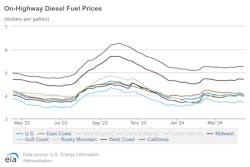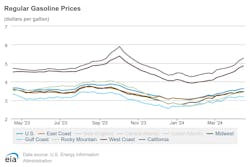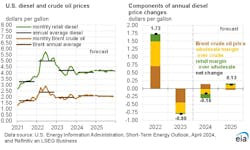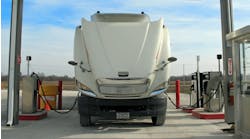After last week’s spike in diesel costs, the U.S. Energy Information Administration (EIA) reported this week that prices dipped once more, relatively maintaining the price plateau diesel has enjoyed since about mid-February. Diesel costs are also largely cheaper than this time last year, with the U.S. on-highway diesel fuel price average at $4.015 per gallon. This amount is 4 cents cheaper than last week and 10 cents less than last year.
Otherwise, the only region which saw a diesel price increase was the New England sub-region, where diesel costs rose by less than a cent to $4.311. In every other region, prices fell between less than 1 cent and 6 cents overall. California’s diesel costs dipped less than 1 cent to $5.256 per gallon, and the West Coast in total saw its costs drop 2 cents to $4.702, while the West Coast without California dropped 3 cents to $4.218 per gallon.
Meanwhile, the Lower-Atlantic subregion’s diesel costs dropped 6 cents to $3.979 per gallon, while the East Coast, Gulf Coast, and Rocky Mountain regions all saw a price cut of 5 cents. Accordingly, the East Coast’s rate for diesel is now $4.068, the Gulf Coast’s $3.710, and the Rocky Mountain region’s $3.956 per gallon. This leaves the Gulf Coast as the cheapest place to buy diesel fuel, while California is the most expensive.
In comparison, the AAA motor club placed its current diesel average at $4.038, roughly 2 cents cheaper than the EIA. Last week’s average was about 1 cent cheaper, and last year’s average about 17 cents less, according to the organization.
According to the EIA’s Short-Term Energy Outlook (STEO), monthly retail diesel prices are almost exactly at the organization’s annual diesel cost average. However, the STEO also noted that they will “no longer publish a breakout of diesel fuel and fuel oil as components of total distillate fuel,” and only report total distillate fuel instead and some of the distillate fuel for the electric power sector.
Read more: Gas and diesel costs up, diesel over $4
Gas prices continue unsteady rise to $3.628
Nationwide, gasoline prices are currently at $3.628 per gallon, 3 cents higher than last week and 3 cents less than this time last year. The only region spared from the price increase was the Gulf Coast, where gas costs dropped 3 cents to $3.177.
In the meantime, gas prices rose the least in the Midwest at less than 1 cent to $3.465 per gallon, while the Rocky Mountain region saw a rise of 4 cents to $3.428. Prices increased the most along the West Coast, with California seeing a 12-cent increase in gas costs to $5.271 per gallon. Costs also rose 10 cents in the West Coast overall to a gas rate of $4.853 per gallon, and 7 cents on the West Coast without California to $4.396. Beyond the West Coast, the East Coast also saw prices rise 6 cents to $3.451 per gallon.
This leaves the Gulf Coast as the cheapest place for gas at $3.177 per gallon, while California is still the most expensive at $5.271.
In comparison, the AAA gas average is currently at $3.634 per gallon, 4 cents higher than last week. Last year’s average at this time was $3.668, 3 cents higher than now. Both the STEO and the AAA attributed the gasoline cost rise to geopolitical events abroad, with the STEO anticipating that the Brent crude oil spot price average will be $90 per barrel in Q2 of 2024, $2 per barrel more than March’s STEO, for an average of $89 per barrel throughout the rest of the year.
“Renewed Ukrainian attacks on Russia’s oil infrastructure and increasing tension in the Middle East spiked oil prices recently,” said Andrew Gross, AAA spokesperson. “And with the cost of oil accounting for roughly 60% of what we pay at the pump, there will likely be some upward pressure on prices.”
This article was originally published on FleetOwner.com.







